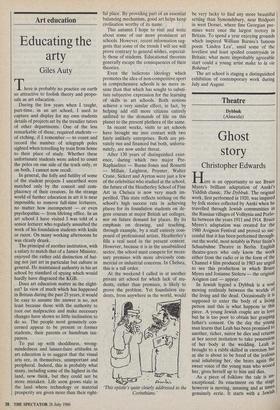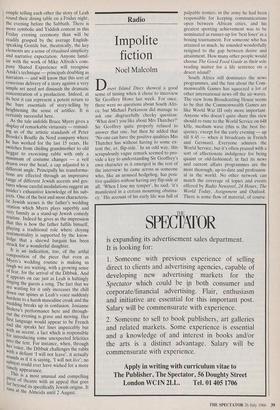Theatre
Dybbuk (Almeida)
Ghost story
Christopher Edwards
Here is an opportunity to see Bruce Myers's brilliant adaptation of Anski's Yiddish classic, The Dybbuk. The original work, first performed in 1920, was inspired by folk stories collected by Anski when he travelled through Jewish communities in the Russian villages of Volhynia and Porlo- lia between the years 1911 and 1914. Bruce Myers's adaptation was created for the 1980 Avignon Festival and proved so suc- cessful that it has been performed through- out the world, most notably in Peter Stein's Schaubuhne Theatre in Berlin. English theatre-goers who only know the work either from the radio or in the form of the Channel 4 film produced in 1983 are urged to see this production in which Bruce Myers and Josianne Stolen' — the original Avignon cast — appear. In Jewish legend a Dybbuk is a soul moving restlessly between the worlds of the living and the dead. Occasionally it is supposed to enter the body of a living person and this is what happens in this piece. A young Jewish couple are in love but he is too poor to obtain her grasping father's consent. On the day the young man learns that Leah has been promised to another, richer, suitor he dies and returns at her secret invitation to take possession of her body at the wedding. Leah is brought to a rabbi skilled in exorcism but as she • is about to be freed of the jealous soul inhabiting her, she hears again the sweet voice of the young man who wooed her, gives herself up to him and dies.
As a piece of folklore the tale is un- exceptional. Its enactment on the stage however is moving, amusing and at times genuinely eerie. It starts with a Jewish couple telling each other the story of Leah round their dining table on a Friday night, the evening before the Sabbath. There is more symbolic and Yiddish content in this Friday evening ceremony than will be readily grasped by the average English- speaking Gentile but, theatrically, the key elements are a sense of ritualised simplicity and narrative expectation. Anyone famil- iar with the work of Mike Alfreds's com- pany Shared Experience will recognise Anski's technique — principals doubling as narrators — and will know that this sort of conscious delivery of a story against a very simple set need not diminish the dramatic concentration of a production. Indeed, at its best it can represent a potent return to the bare essentials of story-telling by heightening the sense of artifice. It is certainly successful here.
As the tale unfolds Bruce Myers gives a display of remarkable virtuosity — remind- ing us of the artistic standards of Peter Brooks's Bouffe du Nord company where he has worked for the last 15 years. He switches from chiding grandmother to old beggar to exorcising rabbi with only a minimum of costume changes — a veil drawn over the head, a cap adjusted to a different angle. Principally his transforma- tions are effected through an impressive range of different Jewish accents and ges- tures whose careful modulations suggest an insider's exhaustive knowledge of his sub- jects. One of the best and most characteris- tic Jewish scenes is the father's wedding oration which Myers plays superbly and very funnily as a stand-up Jewish comedy routine. Indeed he gives us the impression that this is how the father fulfils himself, playing a traditional role where cloying sentimentality is supported by the know- ledge that a shrewd bargain has been struck for a wonderful daughter. It is an indication, too, of the artful composition of the piece that even as Myers's wedding routine is making us laugh we are waiting, with a growing sense of fear, for the arrival of the Dibbuk. And it appears on cue just as Leah is haltingly singing the guests a song. The fact that we are waiting for it only increases the chill down our spines as Leah's voice suddenly hardens to a harsh masculine croak and the wedding breaks up in confusion. Josianne Stoleru's performance here and through- out the evening is grave and moving. Her first language would appear to be French and she speaks her lines impeccably but with an accent, a fact which is responsible for introducing some unexpected felicities into the text. For instance, when, through her voice, the Dibbuk challenges the rabbi with a defiant 'I will not leave', it actually sounds as if it is saying, 'I will not live';no subtext could ever have wished for a more timely appearance. This is a most unusual and compelling Piece of theatre with an appeal that goes far beyond its specifically Jewish origins. It runs at the Almeida until 2 August.



















































 Previous page
Previous page